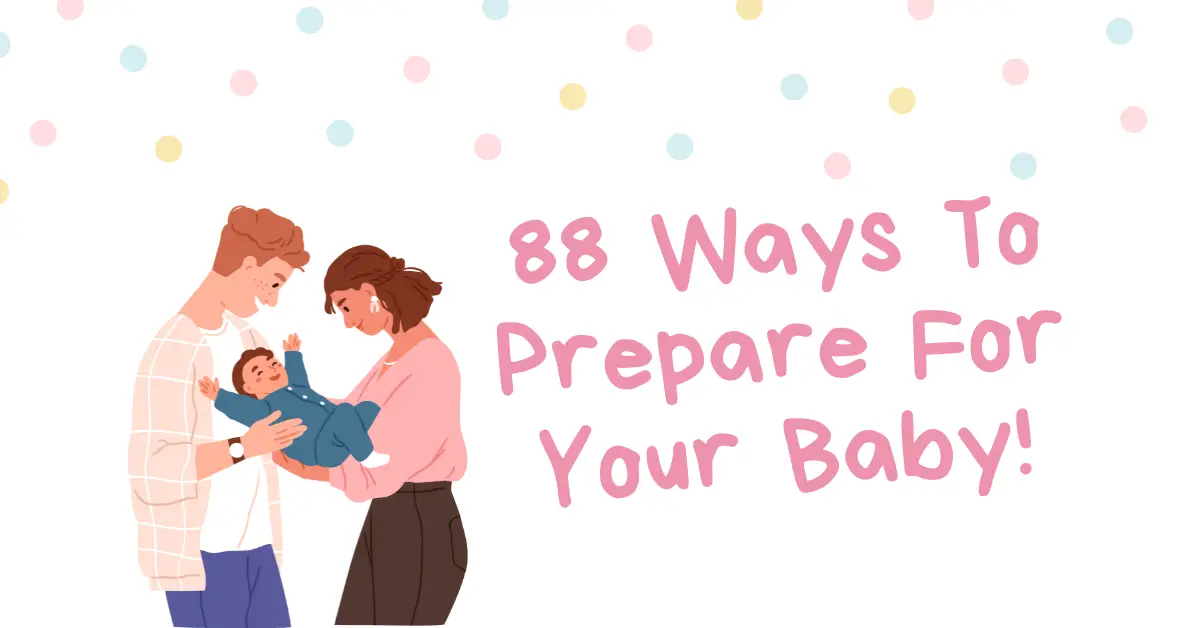Welcoming a new baby into your life is an exciting, rewarding, and life-changing journey. It is a period filled with joy, anticipation, and sometimes a little bit of nervousness. While it’s an incredibly special time, there’s also a lot to think about and prepare for. From organizing your finances and setting up a nursery, understanding your baby’s development, preparing for delivery, and planning for the postpartum period, every step is crucial in ensuring a smooth transition into parenthood.
Our guide is a roadmap for expecting parents to navigate this wonderful journey. It equips you with essential tips, practical advice, and expert insights to help you get ready for the arrival of your little one.
So, whether you’re a first-time parent or just in need of a refresher, let’s dive in and start this exciting preparation process together.
Understanding Pregnancy
Pregnancy is a rollercoaster of emotions and physical changes. Whether it’s your first or third, understanding the journey can make it smoother. Here’s a step-by-step guide to understanding pregnancy.
1. Detect the Early Signs
Pregnancy can bring with it a multitude of symptoms. Keep an eye out for the common ones, which include missed periods, fatigue, tender breasts, mood swings, frequent urination, and nausea or vomiting. Remember, every woman’s experience is unique, and these symptoms can also be indicative of other conditions.
2. Confirm Your Pregnancy
If you’ve noticed any of these signs and suspect you’re pregnant, take a home pregnancy test. They’re easy to use and generally reliable. However, for an official confirmation, it’s always best to consult a healthcare professional.
3. Schedule Your First Prenatal Visit
Once your pregnancy is confirmed, make an appointment with your doctor or midwife for your first prenatal check-up. This appointment is typically more detailed and longer than the subsequent ones.
4. Understand the Tests
During your prenatal visits, expect several tests. The initial ones may include blood tests for blood type, Rh factor, anemia, infections, and immunity to rubella. You may also undergo a urine test to check for urinary tract infections and high protein levels, indicative of preeclampsia.
5. Get Regular Ultrasounds
Throughout your pregnancy, ultrasounds are used to monitor your baby’s growth and development. These magical moments when you can see your baby are often highlights of the prenatal journey.
You may opt for an optional 3D or 4D ultrasound as well.
6. Monitor Your Glucose
As you progress further into your pregnancy, you’ll have a glucose screening test to check for gestational diabetes. This is usually done between the 24th and 28th weeks of pregnancy.
7. Take the Group B Strep Test
Closer to your delivery date, you’ll have a Group B Strep test. This test is important as it helps prevent any potential infection to your baby during delivery.
8. Ask Questions
Make the most of your prenatal visits by asking questions. Whether you’re curious about what happens in each trimester, the stages of labour, options for pain relief during delivery, or breastfeeding, your healthcare provider is there to guide you.
Remember, pregnancy is a unique journey for every woman. Be proactive, stay informed, and prepare yourself for the life-changing experience of becoming a parent.
Most importantly – if you have any medical questions about your pregnancy – talk to your doctor! We aren’t doctors and 99% of the internet isn’t either. Talk to your doctor so you can get advice specific to your pregnancy.

Financial Planning
Becoming a parent brings immeasurable joy, but it also brings a significant financial commitment. From diapers to daycare and everything in between, having a baby can have a substantial impact on your budget. So, it’s crucial to plan your finances ahead. Here’s a comprehensive guide to help you financially prepare for your little one.
9. Estimate the Cost of Raising a Child
According to the USDA, the average cost of raising a child until they’re 18 is more than $200,000, not including the cost of college. This figure can vary depending on where you live, your lifestyle, and other factors. Get a rough estimate of the costs to set the groundwork for your financial planning.
10. Start Budgeting
A budget is a powerful tool that can give you control over your finances. Start by listing your current income and expenses. Then, estimate the additional costs that will come with the baby, such as healthcare, baby gear, clothes, food, and childcare. Make adjustments as necessary to ensure your income can cover these expenses.
11. Build an Emergency Fund
If you don’t already have an emergency fund, now is the time to start building one. Aim for a fund that can cover three to six months of living expenses. This money can act as a safety net for unexpected costs or income loss.
12. Review Your Health Insurance
Check what your health insurance covers regarding prenatal care, childbirth, and newborn care. If your insurance doesn’t provide adequate coverage, consider switching plans or adding a supplemental policy.
13. Plan for Maternity and Paternity Leave
In Canada, you’ll have options of 12 or 18 months of leave. See the Government of Canada’s website for the details. In the USA, I’m sorry, but you’ll need to look into what your company offers for maternity leave.
14. Save for Childcare
Childcare can be one of the biggest expenses for parents. Research the costs of various options, such as daycare, a nanny, or a babysitter, and start saving accordingly. Also, consider whether adjusting your work schedules can help reduce these costs.
15. Consider Life Insurance
If you don’t already have life insurance, now is the time to consider it. Life insurance can provide financial protection for your family in the event of your death. When choosing a policy, consider your income, debts, and the future costs of raising your child.
16. Start a College Fund
It’s never too early to start saving for your child’s education. Consider setting up an RRSP if you’re in Canada or a 529 college savings plan in the USA, which offers tax advantages or government matching for education savings.
17. Baby-Proof Your Budget
Babies require a lot of stuff – from diapers and clothes to toys and furniture. Look for ways to save money, like buying second-hand items, borrowing from friends, or taking advantage of sales and discounts.
18. Plan for the Long-Term
Having a baby changes your financial priorities. You may need to adjust your long-term financial goals, such as buying a house, retirement, or travel plans. Make sure to factor these into your financial planning.
Remember, financial planning for a baby is not a one-time task but an ongoing process. Your needs and expenses will change as your child grows, so be prepared to adjust your budget and financial plans accordingly. It might seem overwhelming at first, but with careful planning and smart decisions, you can navigate the financial challenges of raising a child successfully.

Shopping For A Newborn Baby
Preparing for a new baby can be both exciting and a bit overwhelming, especially when it comes to shopping for baby essentials. From the nursery to clothing to feeding supplies, it’s easy to get lost in the sea of baby products available. Here’s your essential guide to baby shopping, ensuring you have everything you need for your little one.
19. Create a Baby Registry
A baby registry is a list of items you’d like to have for your baby. Share this with friends and family, and they can choose items from the list for baby shower gifts. This helps ensure you receive items you actually need – perhaps even a baby swing for your big baby.
20. Choose the Right Crib
Your baby’s crib is one of the most significant purchases you’ll make. It should be sturdy, safe, and meet all current safety standards. Don’t forget to buy a firm, well-fitting mattress and several fitted sheets.
21. Invest in a Quality Car Seat
All states require an infant car seat, so this is a non-negotiable item. Make sure the car seat meets safety standards and is suitable for a newborn. Many parents opt for a travel system that includes a car seat and a stroller.
22. Select a Stroller That Fits Your Lifestyle
Consider where you live, where you’ll be walking, and if you need space for storage when selecting a stroller. Some parents opt for a lightweight stroller for quick trips and a robust one for long walks or jogging.
23. Stock Up on Clothing
Newborns go through several outfit changes in a day. Stock up on basics like onesies, sleep sacks, sleepers, and swaddles. Remember, comfort and ease of changing are more important than style.
24. Prepare for Feeding
If you’re planning on breastfeeding, you’ll need nursing bras, a breast pump, milk storage containers, and nursing pads. If you’re formula feeding, you’ll need bottles, a bottle brush, and a sterilizer. Remember to have a few bibs and burp cloths on hand too.
25. Diapering Essentials
Whether you choose cloth or disposable diapers, you’ll need plenty. Also, invest in a quality changing table or pad, dirty diaper disposal, diaper rash cream, a diaper bag, and baby wipes.
If you break your diaper genie, you can also learn about fixing them here.
26. Bathing and Grooming
A baby bathtub can make cleaning your infant safer and easier. You’ll also need baby shampoo, body wash, a soft towel, a baby brush, and nail clippers.
27. Health and Safety Items
A digital thermometer, baby gate, outlet covers, cabinet locks, and a baby monitor are all essential for keeping your little one safe and healthy.
28. Don’t Forget the Fun Stuff
Toys, books, and a mobile can keep your baby entertained and help them develop their senses and motor skills.
29. Consider Buying Second-Hand
Babies outgrow items quickly, so consider buying gently used items or accepting hand-me-downs from friends or family. Just make sure safety standards are met, especially for items like car seats and cribs.
30. Prepare for Baby’s Arrival
Once you’ve bought all your baby gear, spend some time washing and organizing everything. Set up the nursery, install the car seat, and pack your hospital bag.
Remember, while it can be tempting to buy every adorable item you see, focus on the essentials first. It’s always possible to buy additional items after the baby is born and you have a better sense of what you need. Happy shopping!
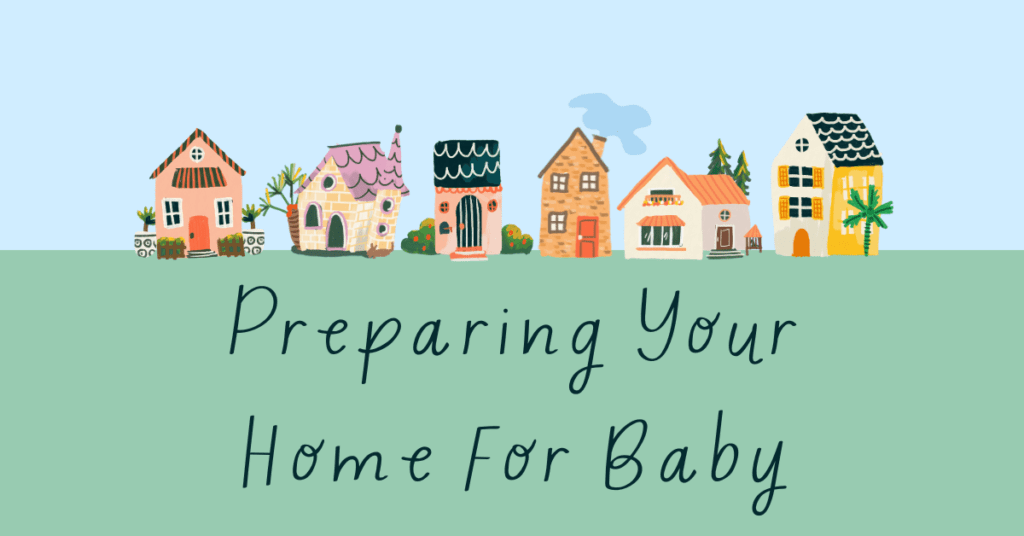
Preparing Your Home for Baby
With a baby on the way, your home is about to become the centre of a lot of activity. From creating a cozy nursery to baby-proofing every corner, it’s essential to ensure your space is ready for its newest occupant. Here’s a step-by-step guide to help you prepare your home for your baby.
31. Design and Set Up the Nursery
The nursery is where your baby will spend a lot of their time. Choose a quiet, convenient space for it. Decorate it with calming colors, install blackout curtains for optimal nap conditions, and ensure the room has a comfortable temperature.
32. Organize Baby Essentials
From diapers to clothes, babies require a lot of stuff. Use dressers, shelves, and baskets to organize everything. Place items you’ll use frequently, like diapers and wipes, in easily accessible locations.
33. Create a Changing Station
Set up a comfortable, safe place for diaper changes. It should be equipped with a changing pad, diapers, wipes, and a bin for dirty diapers. You might want to consider setting up a secondary changing station in your living area for convenience.
You may also want to compare brands of wipes to figure out what’s going to work best for you and your baby. You’ll also want to try out different brands of diapers to see what fits your baby best.
34. Set Up a Feeding Area
If you’re nursing, create a comfortable nursing station with a supportive chair, nursing pillow, and a side table to hold supplies like burp cloths, a water bottle, and snacks. For formula-feeding parents, an area in the kitchen with easy access to bottles, formula, and sterilizing equipment is essential.
35. Baby-Proof Your Home
Start baby-proofing your home early. Cover sharp corners, secure furniture to the wall, install baby gates, and use outlet covers. Don’t forget to secure cabinets with childproof locks and keep small objects, cleaning supplies, and medications out of reach.
36. Prepare for Bath Time
Babies need their own special tub for bath time. Set up a bathing area with all the essentials: baby tub, tear-free shampoo and soap, soft washcloths, hooded towels, and a comfortable place for you to kneel or sit.
37. Ensure a Smoke-Free Environment
If anyone in the house smokes, it’s time to stop. Secondhand smoke increases the risk of SIDS and can lead to other health problems in infants.
38. Set Up a Safe Sleeping Area
Your baby’s crib should be comfortable and safe. Keep it free from toys, blankets, and bumpers as these can increase the risk of SIDS. All your baby needs is a firm mattress with a fitted sheet.
39. Keep Pets in Check
If you have pets, prepare them for the new arrival. This might include training them to stay out of the baby’s room or getting them used to the new sounds and smells.
40. Install a Baby Monitor
A baby monitor can give you peace of mind, allowing you to hear or see your baby when you’re in a different room. Consider one with a video feature for added reassurance.
41. Stock Up on Cleaning Supplies
Babies can be messy. Keep a good stock of cleaning supplies, including laundry detergent suitable for sensitive skin, disinfecting wipes, and spot cleaner for carpet and upholstery.
42. Create a Quiet Space for Yourself
Amid all the baby preparations, don’t forget about your own needs. Create a quiet, relaxing space where you can unwind and take care of yourself.
Remember, preparing your home for a baby doesn’t have to be stressful. Tackle tasks one at a time and ask for help if you need it. Soon, your home will be ready to welcome your little one.
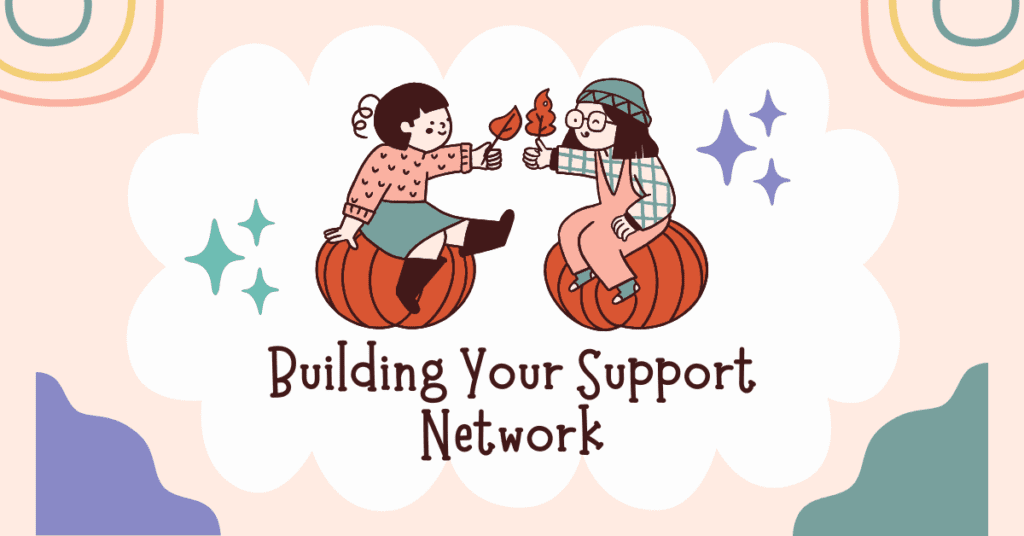
Building Your Support Network
Having a baby is a joyous and life-changing event, but it can also be overwhelming. That’s where your support network comes in. Whether it’s family, friends, or professionals, these are the people who will help you navigate parenthood. Here’s a guide to building your support network as an expecting parent.
43. Engage Family and Friends
Loved ones often play a significant role in your support network. They can provide emotional support, share parenting advice, and lend a helping hand when needed. Keep them involved in your journey, and don’t hesitate to ask for help when you need it.
44. Connect with Other Parents
Other parents can offer a wealth of practical advice, reassurance, and empathy. They understand what you’re going through and can provide insights from their own experiences. Join local parenting groups or online communities to connect with others.
45. Find a Reliable Babysitter
It’s important to have a reliable babysitter or two on call. They can provide occasional relief, allowing you to rest, run errands, or enjoy some much-needed alone time. Start your search early and take the time to find someone trustworthy and experienced with newborns.
46. Identify a Good Pediatrician
Your baby’s doctor is a crucial part of your support network. They’ll monitor your baby’s health and development, administer vaccinations, and be your go-to resource for health concerns. Take the time to find a pediatrician you trust and feel comfortable with.
47. Consider Professional Help
A postpartum doula, lactation consultant, or home health nurse can provide specialized help during the early days of parenthood. They can offer guidance on breastfeeding, newborn care, recovery from childbirth, and more.
48. Attend Prenatal Classes
Prenatal classes are a great way to prepare for childbirth and parenting. They can help you understand what to expect during labour, the basics of newborn care, breastfeeding, and more. Plus, they’re another great way to connect with other expecting parents.
49. Get to Know Your Neighbors
If you have good relationships with your neighbours, they can be an excellent source of support. They can help in emergencies, lend items you may need, or just offer a friendly ear when you need to vent.
50. Lean on Your Partner
If you have a partner, remember that they’re an integral part of your support network. Keep communication open, share your feelings, and work together as a team. It’s a big transition for them too, and supporting each other is key.
During this time, consider taking a trip away together – a babymoon – to spend quality relaxing time together before the baby arrives.
51. Explore Local Resources
Look for resources in your community, such as parent-and-baby groups, libraries, recreation centres, and more. These can provide opportunities to socialize, learn, and get out of the house.
52. Take Care of Your Mental Health
Postpartum depression and anxiety are common, and it’s important to have support in place. This could be a mental health professional, a trusted friend, or a support group. Know the signs and don’t hesitate to seek help if you need it.
Remember, it’s okay to ask for help and lean on others. You’re not expected to navigate parenthood alone. Building a strong support network can make the journey smoother and more enjoyable. So reach out, connect, and remember, every parent needs help sometimes.

Preparing For Pregnancy
Your health during pregnancy plays a vital role in the well-being of your baby. From regular checkups to a balanced diet, to keeping stress in check, taking care of your health and wellness should be a top priority. Here’s an ultimate guide to prenatal health and wellness.
53. Schedule Regular Prenatal Checkups
Regular prenatal visits allow your healthcare provider to monitor your health and your baby’s development. These appointments are also an opportunity to ask any questions or discuss concerns.
54. Adopt a Balanced Diet
Eating a variety of foods can provide the nutrients you and your baby need. Focus on lean proteins, whole grains, fruits, vegetables, and healthy fats. Also, consider taking prenatal vitamins to ensure you’re getting essential nutrients like folic acid and iron.
55. Stay Hydrated
Hydration is especially important during pregnancy. Water aids in the delivery of essential nutrients to your baby and helps maintain healthy amniotic fluid levels. Aim for at least 8-10 glasses of water per day.
56. Engage in Regular Exercise
With your doctor’s approval, regular, moderate exercise can benefit both you and your baby. It can help manage pregnancy symptoms, prepare your body for childbirth, and boost your mood. Walking, swimming, and prenatal yoga are great options.
57. Prioritize Sleep
Your body is working hard to grow a new life, so adequate sleep is crucial. Aim for 7-9 hours per night, and don’t hesitate to take naps if you’re feeling tired.
58. Avoid Harmful Substances
This includes alcohol, tobacco, and illicit drugs, which can all harm your baby’s development. Also, be cautious with prescription and over-the-counter medications. Always consult with your healthcare provider before taking any medication during pregnancy.
59. Manage Stress
High levels of stress can affect your pregnancy and your baby’s development. Find healthy coping mechanisms that work for you, such as mindfulness, meditation, gentle exercise, or talking to a friend or a professional.
60. Educate Yourself
Read books, attend prenatal classes, or do online research about pregnancy, childbirth, and newborn care. The more informed you are, the more confidently you can make decisions about your care.
61. Listen to Your Body
Every pregnancy is unique, and you know your body best. If something doesn’t feel right, don’t hesitate to contact your healthcare provider. Trusting your instincts is an important part of prenatal care.
62. Prepare for Childbirth
Look into childbirth education classes to help you understand what to expect during labour and delivery. Explore your options for pain relief, and create a birth plan if you choose to.
63. Build Your Support Network
Surround yourself with people who provide emotional and practical support. This could be a partner, family, friends, or a pregnancy support group.
64. Attend to Your Mental Health
Pregnancy can bring a range of emotions, and it’s not uncommon to experience mood swings or anxiety. Reach out to a professional if you’re feeling consistently down or overwhelmed.
Remember, taking care of your health during pregnancy is one of the best gifts you can give your baby. Listen to your body, seek regular prenatal care, and take steps to maintain a healthy lifestyle. Your commitment to prenatal health and wellness will help pave the way for a healthier pregnancy and a healthier baby.
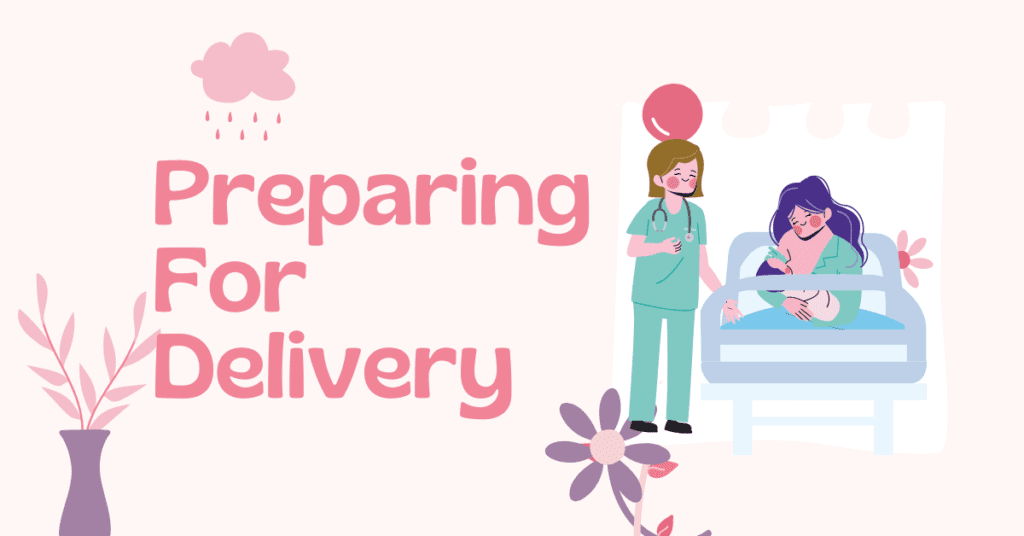
Preparing for Delivery
As your due date approaches, it’s important to prepare for the big day. From knowing the signs of labour to packing a hospital bag, to understanding your birth plan, proper preparation can help you feel more confident and less stressed. Here’s a comprehensive guide to preparing for delivery.
65. Understand the Signs of Labor
Familiarize yourself with the signs of labour, such as regular contractions, water breaking, and lower back pain that doesn’t ease up. If you’re unsure whether you’re in labour, it’s always better to call your healthcare provider.
66. Create a Birth Plan
A birth plan outlines your preferences for labour and delivery, such as pain relief options, who you want in the room, and any special practices you’d like to follow. Share this plan with your healthcare provider and birth partner.
67. Pack Your Hospital Bag
About a month before your due date, pack a bag with everything you’ll need for the hospital. Include items for you (clothing, toiletries, snacks), for the baby (clothes, diapers), and for your partner or support person (snacks, change of clothes).
68. Plan Your Route to the Hospital
Determine the fastest and most reliable route to your hospital or birth centre. Make sure you know where to park and which entrance to use. It can be helpful to do a dry run before the big day. Many hospitals around us actually offered tours so you could get to see where you’d actually be giving birth and what amenities the ward might have.
69. Arrange Childcare for Older Siblings
If you have other children, arrange in advance for someone to take care of them when you go into labour. Make sure this person is reliable and available at any time.
70. Pre-register or Phone Ahead to the Hospital
Many hospitals allow you to pre-register, which means filling out all necessary paperwork in advance. This can save you time and reduce stress when you arrive in labour. In Canada – preregistering is often not necessary but you can call ahead once labour begins to let them know you’re on your way. Some hospitals can be full and they may send you to another hospital with more room – don’t panic it happened to us and all was great.
71. Learn About Pain Relief Options
Pain management during labour varies widely from person to person. Research your options, such as epidurals, nitrous oxide, and natural pain relief methods, so you can make an informed decision that aligns with your comfort level and birth plan.
72. Prepare for a Potential C-Section
Even if you’re planning a vaginal delivery, it’s worth understanding what a C-section involves in case one becomes necessary. Knowing what to expect can help reduce anxiety if your delivery plan changes.
73. Know What to Expect After Delivery
In the first few hours after birth, you’ll likely experience a range of emotions and physical sensations. Understanding what’s normal can help you feel more prepared. Ask your healthcare provider what you can expect regarding recovery, newborn care, breastfeeding, and more.
74. Prepare Your Home for Your Return
Before you go into labour, prepare your home for your return with the baby. Stock up on essentials, set up the nursery, prepare some meals in advance, and ensure your home is clean and comfortable.
75. Emotionally Prepare for Labor and Delivery
Giving birth is a major event, and it’s natural to feel a mix of excitement, anticipation, and nervousness. Talk through your feelings with your partner, a trusted friend, or a professional. Consider practising relaxation techniques like deep breathing or mindfulness to help manage anxiety.
76. Attend a Childbirth Class
Childbirth classes can provide valuable information about labour, delivery, pain management options, and newborn care. They can also be a great way to connect with other expecting parents.
77. Consider Hiring a Doula
A doula is professionally trained in childbirth who provides emotional, physical, and educational support to a mother before, during, and shortly after childbirth. Research shows that having a doula can lead to a more positive birth experience.
78. Stay Flexible and Open-Minded
While it’s important to have a plan, understand that labour and delivery can be unpredictable. Being flexible and open-minded can help you adapt to any changes that may come your way.
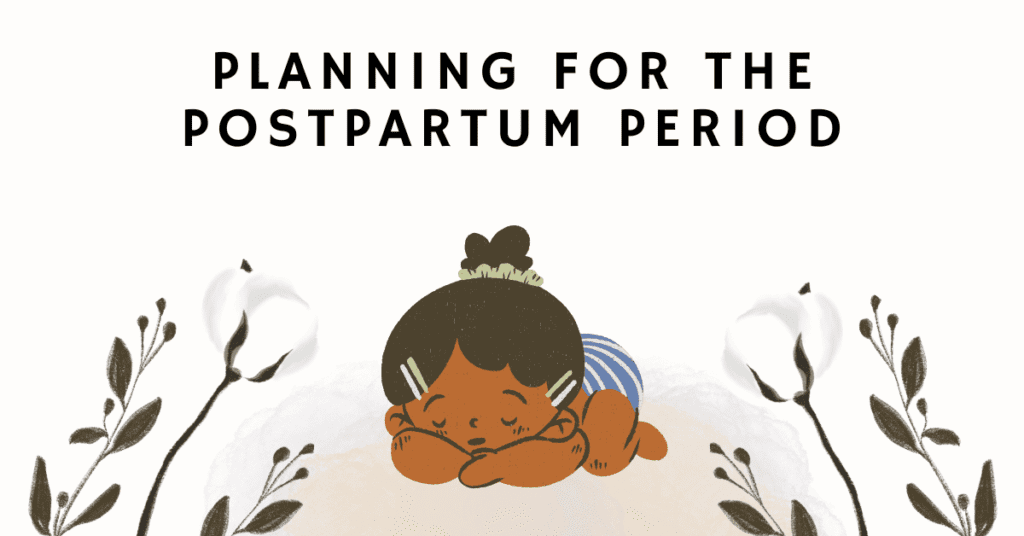
Planning for the Postpartum Period
The postpartum period, or the “fourth trimester,” is a time of significant physical and emotional change as you recover from childbirth and adjust to life with a newborn. Here’s how to plan for this important time.
79. Arrange for Help
The first few weeks with a newborn can be intense. If possible, arrange for help from your partner, family, or friends. Even small tasks like cooking a meal or doing a load of laundry can be a big help.
80. Prepare Meals in Advance
In the hustle and bustle of newborn care, it can be hard to find time to cook. Consider preparing and freezing meals before your baby arrives, or setting up a meal train with friends and family.
81. Set Up a Comfortable Nursing Station
If you plan to breastfeed, set up a comfortable area with everything you’ll need, such as nursing pillows, burp cloths, water, and snacks.
82. Understand Newborn Care Basics
Before your baby arrives, familiarize yourself with the basics of newborn care, including diapering, bathing, and safe sleep practices. The newborn stage officially lasts for 4 weeks and are generally in the newborn stage until about 2 months.
83. Prioritize Your Health
Postpartum recovery can take time and patience. Follow your healthcare provider’s advice about postpartum checkups, physical activity, and rest.
84. Be Aware of Postpartum Depression
Postpartum depression is a common and serious mental health condition. Know the signs and don’t hesitate to seek help if you’re feeling consistently down or overwhelmed.
85. Plan for Baby’s Health Care
Before your baby is born, choose a pediatrician and understand your baby’s upcoming check-ups and vaccinations.
86. Accept that There Will Be Challenges
The postpartum period can be filled with joy, but it’s also normal to experience challenges. Accepting that there will be ups and downs can help you navigate this period with a little more ease.
87. Connect with Other New Parents
Connecting with others going through the same experience can provide comfort, reduce feelings of isolation, and offer a space to share advice and encouragement.
88. Remember, It’s Okay to Ask for Help
Whether it’s a lactation consultant for breastfeeding, a postpartum doula for overnight care, or a therapist for emotional support, it’s okay to seek help. You’re not alone in this journey.
Planning for the postpartum period can help you feel more prepared for life with a newborn. While it’s a time of great joy, remember that it’s also a time of transition and adjustment. It’s okay to take things one day at a time and to ask for help when you need it.
Good Luck Preparing and Enjoy Your Newborn!
Preparing for a baby is an exciting, joyous, and at times, overwhelming journey. From planning your finances and understanding your baby’s development to preparing for delivery and the postpartum period, there’s a lot to consider and organize. But remember, the process doesn’t have to be perfect. The most important thing is that you’re taking steps to provide a loving and caring environment for your new addition.
Each step you take in preparation brings you closer to meeting your little one, and it’s okay to ask for help along the way. Seek advice from healthcare professionals, connect with other parents, and lean on your support network. Parenthood is not a solitary journey, and there is a wealth of knowledge and support available to you.
The anticipation of your baby’s arrival is a special time. Enjoy each moment, and remember to also take care of yourself. After all, self-care is a crucial part of being a happy, healthy parent. With thoughtful preparation and a supportive network, you’re on your way to welcoming your baby into the world. So here’s to the journey ahead – it’s sure to be an extraordinary one!

